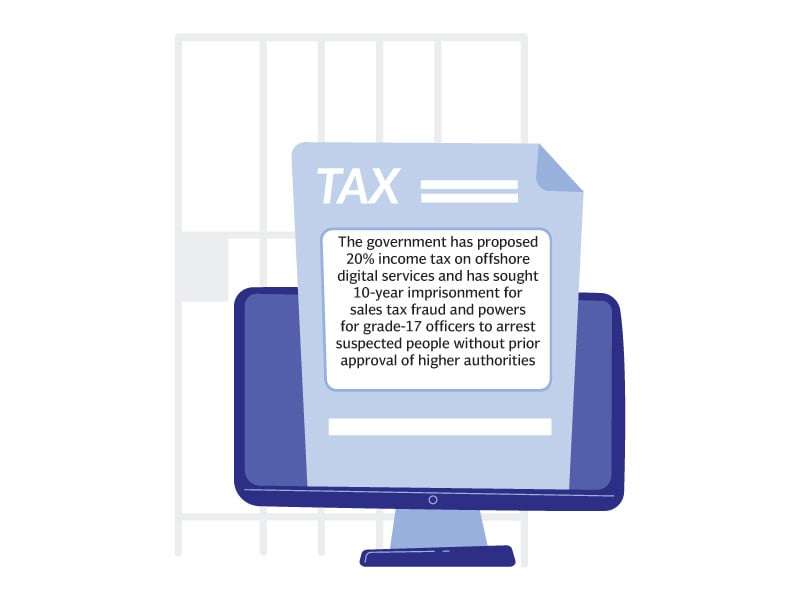
|
Getting your Trinity Audio player ready...
|
ISLAMABAD: The federal government is considering a 20% income tax on offshore digital services, along with tougher penalties for tax fraud, including a 10-year prison sentence. In a bid to curb tax evasion, the government is also mulling the empowerment of junior officers from the Federal Board of Revenue (FBR) to arrest suspects without prior approval from higher authorities, as well as placing individuals on the Exit Control List (ECL) to prevent them from fleeing the country during investigations.
Key Proposals in the Tax Laws Amendment Bill 2024
The Tax Laws Amendment Bill 2024, introduced by Finance Minister Muhammad Aurangzeb in the National Assembly, includes several key changes aimed at curbing tax fraud, increasing penalties, and tightening regulations on offshore digital services.
1. Tax on Offshore Digital Services: One of the most significant changes proposed is a doubling of the income tax rate on offshore digital services from the current 10% to 20%. This tax would apply to services such as online advertising, website design and maintenance, digital content creation, email marketing, online computing, and e-commerce activities that target Pakistani users. The government plans to create a new category specifically for “fees for offshore digital services,” separate from other general fees.
2. Increased Penalties for Tax Fraud: The amendments also propose more stringent penalties for those found guilty of tax fraud. Individuals who evade taxes or pay less than the required amount may face substantial penalties, including imprisonment for up to 10 years and fines up to Rs 10 million. In addition to the offenders, “abettors”—those who assist or conspire in tax fraud—would face the same penalties. The expanded definition of tax fraud will include:
- Underreporting or underpayment of taxes
- Overstating tax credits or refunds
- Submitting false documents or tax returns
- Withholding or manipulating information
- Falsifying invoices or transactions
Empowering FBR Officers
3. Arrest Powers for Junior FBR Officers: Under the proposed changes, junior officers within the FBR would be granted the authority to arrest suspects involved in tax fraud without seeking prior approval from higher authorities, particularly the FBR commissioner. This move is designed to speed up the arrest process when suspects are deemed likely to evade justice. However, post-arrest checks and balances will be instituted, with the commissioner being able to order the release of any suspect arrested unlawfully. In cases of wrongful arrest, disciplinary action would be taken against the officer responsible.
4. Placing Suspects on the ECL: The proposed bill also seeks to empower the FBR commissioner to request that individuals involved in tax fraud be placed on the Exit Control List (ECL) during investigations. This would prevent suspects from fleeing the country before the completion of legal proceedings.
New Restrictions for Ineligible Persons
5. Restrictions on Significant Purchases: Under the proposed amendments, individuals found to be ineligible—due to tax evasion or non-filing—may face restrictions on purchasing significant assets. While the initial draft of the bill allowed ineligible individuals to purchase agricultural tractors, the latest proposal has excluded this exemption, meaning that such individuals will no longer be able to buy tractors. However, restrictions would not apply to motorcycles, rickshaws, or vehicles with engine capacities under 800 CC, or electric vehicles with battery capacities up to 50 kWh. Additionally, investments in securities would also be allowed up to a limit defined by the FBR.
Settling Pending Tax Cases
6. Creation of Review Committee: The government is considering the establishment of a Review Committee to address longstanding tax cases currently pending in high courts across Pakistan. The committee, composed of tax experts, will review these cases and make recommendations to the FBR commissioner. The aim is to resolve old cases efficiently, ensuring fair and timely justice.
FBR’s Focus on Digital Transformation
7. Digitalisation of Tax Processes: Along with these new proposals, the FBR is also looking to digitize its operations to reduce human error and improve transparency. The aim is to streamline tax collection, enhance audit capabilities, and ensure that tax fraud can be detected early through advanced digital tools.
Proposed Impact on the Digital Economy
The proposed increase in tax on offshore digital services could have a significant impact on Pakistan’s digital economy, particularly e-commerce platforms, digital advertisers, and other online service providers. While the government’s move to increase revenue from digital services is understandable, businesses involved in these sectors may face higher operational costs. Some experts have expressed concern that this new tax regime could disincentivize foreign digital companies from entering the Pakistani market, especially at a time when the government is looking to boost digital literacy and online business ventures.
Finance Minister’s Outlook
The Finance Minister emphasized that these measures are necessary to combat tax evasion and encourage greater compliance with tax regulations in Pakistan. The government is confident that by tightening the rules surrounding tax fraud, increasing penalties, and empowering the FBR to act swiftly, it can make significant strides toward improving the country’s fiscal health.
“These steps are part of our broader plan to enhance tax revenue, reduce fraud, and ensure that those who benefit from the country’s economy contribute fairly to its development,” said the Finance Minister.
FAQs
1. What is the proposed tax rate on offshore digital services in Pakistan?
The government is considering a 20% income tax on offshore digital services, which is a significant increase from the current 10%.
2. Will the proposed changes affect digital services like e-commerce and online advertising?
Yes, services such as online advertising, website design, digital content creation, and e-commerce operations targeting Pakistani users will fall under the new category for offshore digital services and will be subject to the 20% tax rate.
3. What penalties are proposed for individuals involved in tax fraud?
Individuals convicted of tax fraud may face up to 10 years in prison, fines up to Rs 10 million, or both. Those who aid in the commission of tax fraud will face similar penalties.
4. Can junior FBR officers arrest suspects without prior approval?
Yes, under the new amendments, junior officers will have the authority to arrest suspects without prior approval from the FBR commissioner in cases of suspected tax fraud.
5. What is the proposed impact on the digital economy in Pakistan?
The proposed 20% tax on offshore digital services may increase operational costs for businesses in the digital economy and could potentially deter foreign companies from entering the Pakistani market.
Conclusion
The proposed amendments to the Tax Laws Amendment Bill 2024 represent a significant shift in Pakistan’s approach to tax enforcement and regulation, particularly in relation to offshore digital services and tax fraud. If passed, these changes could have a profound effect on the country’s digital economy while also tightening the government’s grip on tax evasion. As the National Assembly debates the final draft of the bill, businesses and taxpayers alike will be watching closely to understand the full impact of these changes.






